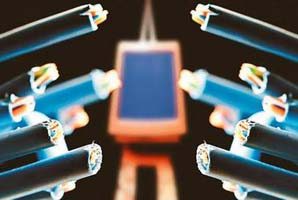New data link that is 250 times faster than standard broadband created
 Canberra, Jan 17: A collaborative research between Australian and US universities has led to the development of a data link that has a connection of one Gigabit per second, which would enable data transfer at an incredibly high speed.
Canberra, Jan 17: A collaborative research between Australian and US universities has led to the development of a data link that has a connection of one Gigabit per second, which would enable data transfer at an incredibly high speed.
Known as the OptIPuter, this supercomputer was built over a duration of 5 years by a team from UCSD (University of California San Diego).
According to a report in the Sydney Morning Herald, the connection has been made possible due to the ultrabroadband optical-fiber link, which is roughly 250 times faster than the standard broadband connection.
It is capable of facilitating optical networking, high storage, and fast processing and visualisation. The computer is linked to 55 high-definition display screens creating a total of 220 million pixels. By comparison, a standard PC can show about 1 to 2million pixels.
The significance of this new technology is immense as there would be a number of potential applications that will flow from it, the report said.
For one, researchers are already talking about sharing data from MRIs, synchrotrons, supercomputers and telescopes to interpret a range of complex data - previously beyond the reach of those in Australia.
It also might mean development of applications like research into the brain using scans that can be shown at the cellular level to drug discoveries and collaboration on high-end climate change research.
According to Professor Iven Mareels, the Dean of Engineering at the University of Melbourne, the technology would make it possible for people on opposite sides of the world to work together on projects in real time.
“For instance, a surgeon in Australia could direct an emergency surgical intervention by operating a robot in Antarctica; scientists in Australia and Japan could share research tools such as the Synchrotron, or operate an underwater robot exploring the Great Barrier Reef - all from the comfort of an OptIPortal room," he said.
"The world can move at a speed that is breathtaking and if you are not committed to maintaining that speed yourself, and you begin to fall behind, it can become essentially impossible to catch up," said Smarr. (ANI)